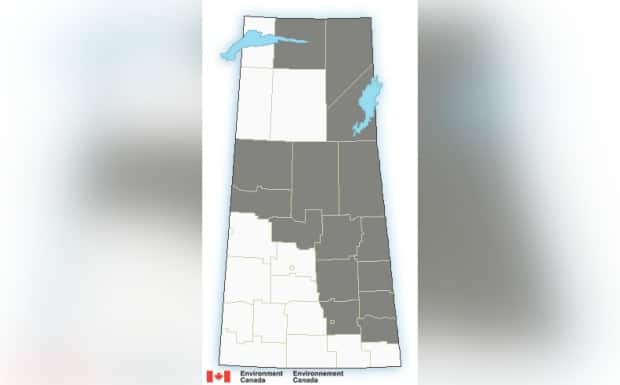Parts of Saskatchewan under special air quality statement due to wildfire smoke

Environment Canada has issued a special air quality statement as smoke from wildfires in the Prairies and B.C. settles over the region.
Air quality will be poor at times, especially over central Saskatchewan.
The federal agency says residents of the province should expect air quality to remain poor for the next few days.
Winds in the region will remain relatively light, so the smoke and haze will continue.
Special air quality statements have been issued for the following areas:
Regina.
Stony Rapids.
Fort Qu'Appelle.
Hudson Bay.
Humboldt.
Buffalo Narrows.
Kamsack.
La Ronge.
Meadow Lake.
Melfort.
Moosomin.
Pelican Narrows.
Prince Albert.
Southend.
Wollaston Lake.
Yorkton.

Environment Canada says people may experience symptoms such as increased coughing, sore throat, headaches and shortness of breath.
Children, seniors and those with lung disease are especially at risk. It's recommended that those with breathing issues stay indoors.
Saskatchewan is reporting 129 active wildfires as of Wednesday morning. Seventeen of them are categorized as not contained.
It's been a concerning season for wildfires in Saskatchewan. As of Monday, there have been 517 fires in the province this year.
That's more than double the five-year average, which in only 245.
Researchers say that this fire season started earlier and the weather was drier than normal, but that these conditions may not remain uncommon in years to come.
Lori Daniels is a professor at UBC and researches the effects of climate change on the nation's forests.
"Future climate projections tell us that these are the fire weather conditions that we will be living with and that fire will be more common in our landscape," Daniels told CBC News' Sam Maciag.
"So it's more important now than ever before that we begin to adapt and learn to coexist with fire."
Researchers have found that the area burning during wildfire season has doubled over the past 60 years.
That growth has been mostly in Northern Canada and Western Canada, Daniels said.

